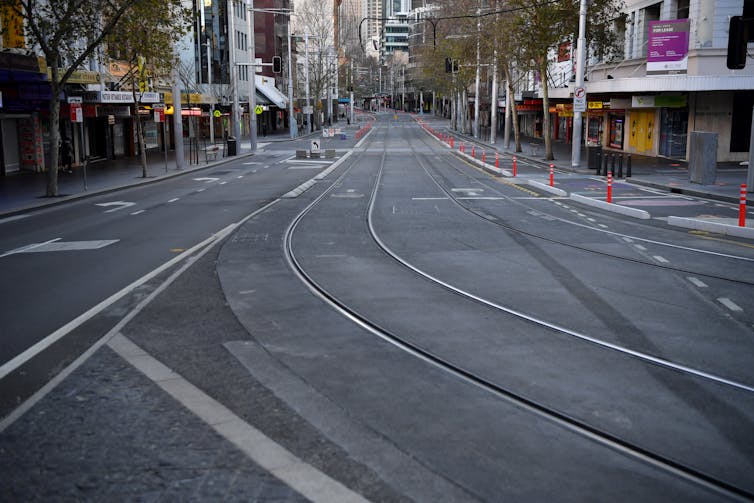For refugees in Australia, life during COVID lockdowns recalls the trauma of war and persecution
- Written by Philippa Specker, Scientia PhD scholar at the Refugee Trauma and Recovery Program, School of Psychology, UNSW
While the COVID-19 pandemic is weighing heavily on everyone’s mental health, people from refugee backgrounds may be uniquely affected, owing to their past traumatic experiences.
As survivors of war and persecution, many refugees have faced the threat of death because of their race, religion, political stance or social group. Some have endured conflict that involved restrictions on their movements, and major social and economic upheaval.
As a result, aspects of the current pandemic may be reminiscent of past traumatic experiences. And this overlap between past and present can have serious and far-reaching consequences for refugee mental health.
Our research[1], published today, found being reminded of past traumatic experiences was the strongest predictor of poor mental health among a group of refugees living in Australia.
Some key findings
During 2020, we surveyed 656 adult refugees living in Australia (predominantly in New South Wales and Victoria) about their experiences during COVID-19 and their mental health.
We then explored the relationships between particular COVID-related stressors and mental health outcomes — post-traumatic stress disorder (PTSD), depression, health anxiety and daily functioning.
The most prevalent stressors were concern about contracting COVID-19, and concern about their family becoming infected, which 66.5% and 72.1% of participants reported respectively. These worries were associated with more severe PTSD symptoms and health anxiety symptoms.
Difficulties engaging socially due to having to stay at home were also common, and were linked to increased depression. Refugees already experience high levels of isolation and loneliness[2], so they’re likely to be particularly vulnerable on this front.
But the strongest predictor of all mental health outcomes was COVID-19 serving as a reminder of past trauma. Some 41.1% of participants said the pandemic reminded them of difficult or stressful experiences in their past, and these respondents reported increased PTSD, depression, health anxiety and poorer daily functioning.
Read more: Explainer: what is post-traumatic stress disorder?[3]
This matches with our clinical experience
Our experience in providing psychological therapy to refugees with PTSD is consistent with these findings.
PTSD affects about one in three refugees[4] and is a psychological condition that can follow traumatic experiences. A person with PTSD continuously experiences intrusive and distressing memories of past trauma.
The pandemic is having a profound yet invisible impact on many refugees because it is reminding them of their very worst memories.
For instance, we’ve heard from some clients that the sight of empty streets is prompting flashbacks of air raids. For others the sensation of wearing a face mask brings up memories of being gagged or hooded during imprisonment and torture.
Some have said lockdowns, quarantine, and a heightened police and army presence in their communities are distressing reminders of political terror or detention.
 For some refugees, the sight of empty streets can prompt traumatic memories.
Joel Carrett/AAP
For some refugees, the sight of empty streets can prompt traumatic memories.
Joel Carrett/AAP
The interplay of past trauma and current circumstances may have serious effects on mental health. Further, this can put refugees at a greater risk of harm generally, with heightened fear creating a barrier to leaving the house for legitimate reasons such as buying food, exercising, getting tested for COVID-19 or accessing medical support[5].
What can we do?
With the escalating COVID-19 outbreak[6] in western Sydney and south-western Sydney, it’s important to remember these suburbs are home to the majority of the refugee population[7] in NSW.
The good news is there are things we can do to minimise the burden of the pandemic on refugee communities. Consultation and engagement with community leaders and experts are the best tools to ensure public health measures and messaging are culturally sensitive and trauma-informed.
For example, providing clear and inclusive information in multiple languages can be an effective way to dispel fears and misinformation. Unfortunately, translated health advice has been lagging[8].
Read more: Lockdowns make people lonely. Here are 3 steps we can take now to help each other[9]
During lockdowns, authorities need to carefully consider the use of police and army personnel[10], and transparently communicate their plans with the public.
They also need to emphasise there are safe pathways for accessing essential services, such as online medical consultations.
Finally, the psychological effects of this pandemic will likely be felt long after the final restrictions have been lifted. So continued funding of mental health services that support refugees will be essential.
There’s resilience too
Refugees enrich Australian society and have a long history of showing resilience in the face of social and economic upheaval. Having already overcome tremendous adversity in their home countries, refugees may be well-placed to navigate the challenges of living through a pandemic. We can all learn a lot from Australia’s refugee communities.
But it can be hard to stay resilient when your sense of safety is threatened. Now is a timely opportunity for government to reflect on the unintended implications of the pandemic on refugee mental health, and ensure steps are taken to prevent unnecessary suffering.
Read more: Refugees without secure visas have poorer mental health – but the news isn't all bad[11]
References
- ^ research (www.tandfonline.com)
- ^ isolation and loneliness (www.sciencedirect.com)
- ^ Explainer: what is post-traumatic stress disorder? (theconversation.com)
- ^ one in three refugees (journals.plos.org)
- ^ accessing medical support (apps.who.int)
- ^ COVID-19 outbreak (www.theguardian.com)
- ^ majority of the refugee population (www1.health.nsw.gov.au)
- ^ been lagging (www.abc.net.au)
- ^ Lockdowns make people lonely. Here are 3 steps we can take now to help each other (theconversation.com)
- ^ army personnel (www.abc.net.au)
- ^ Refugees without secure visas have poorer mental health – but the news isn't all bad (theconversation.com)

















